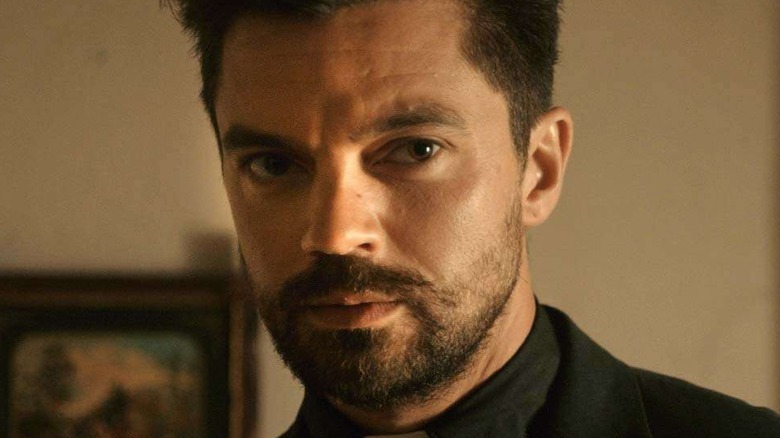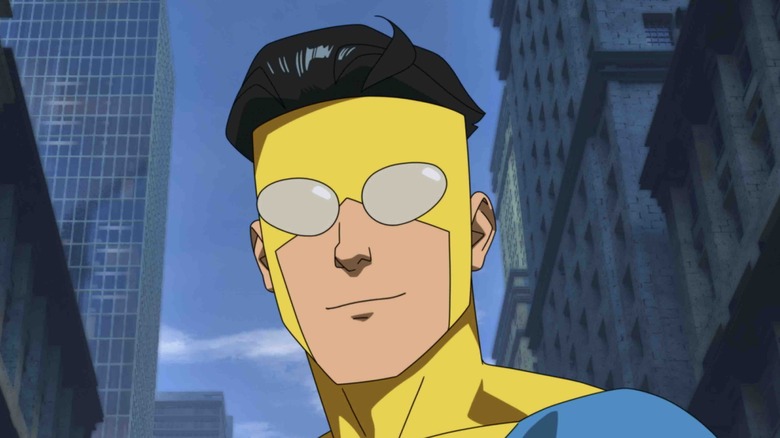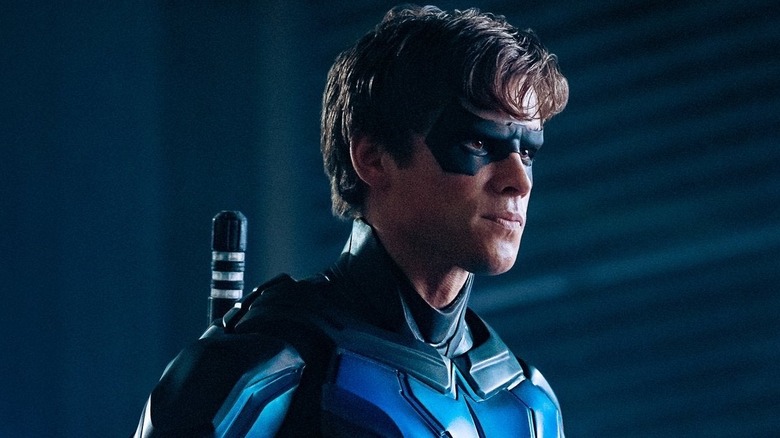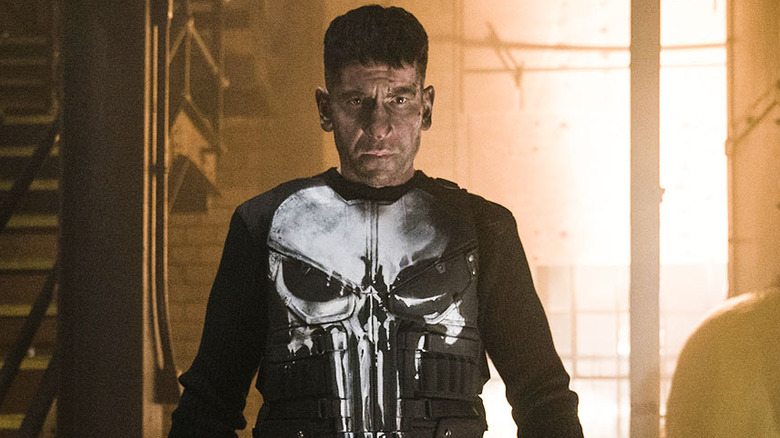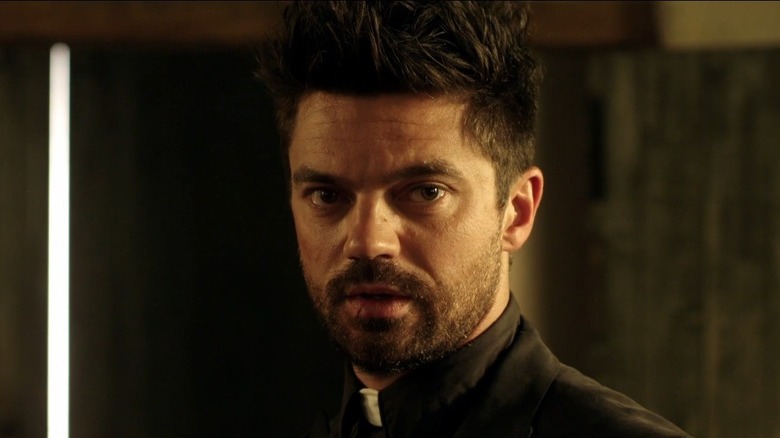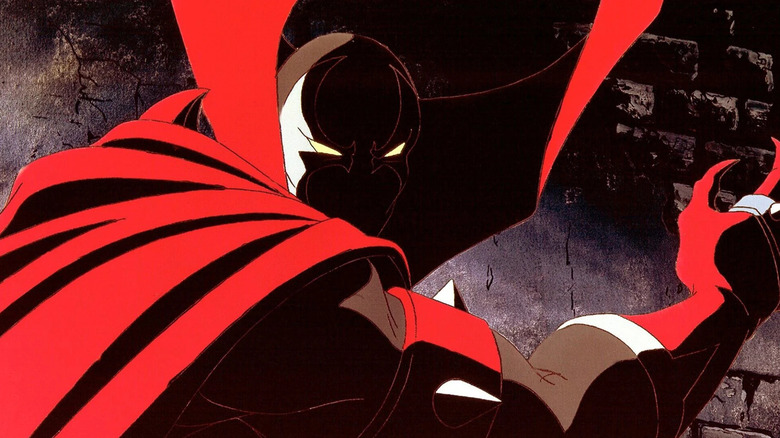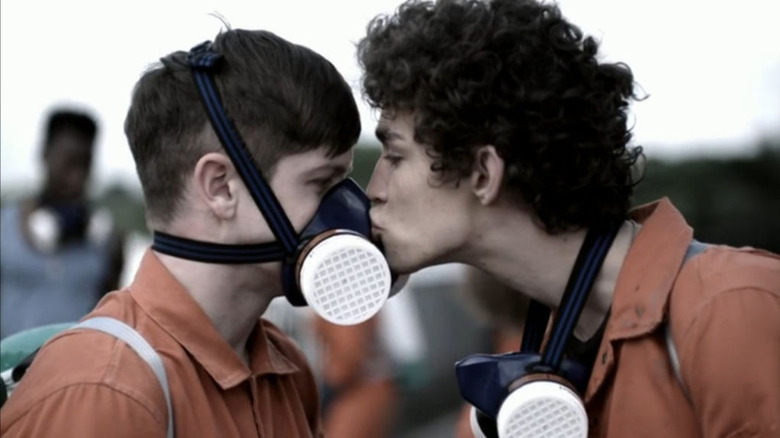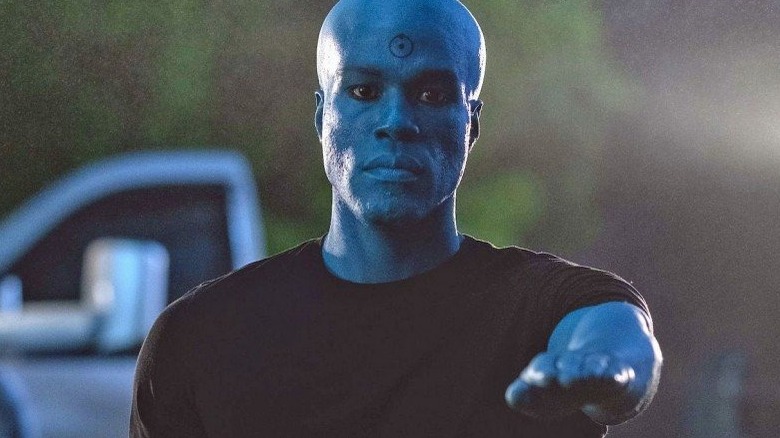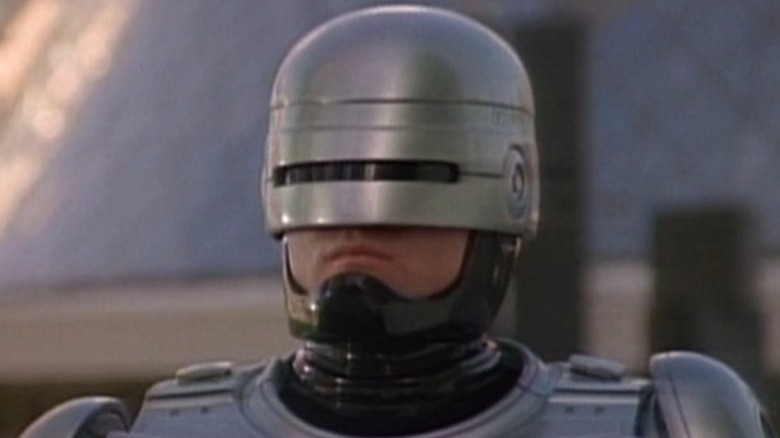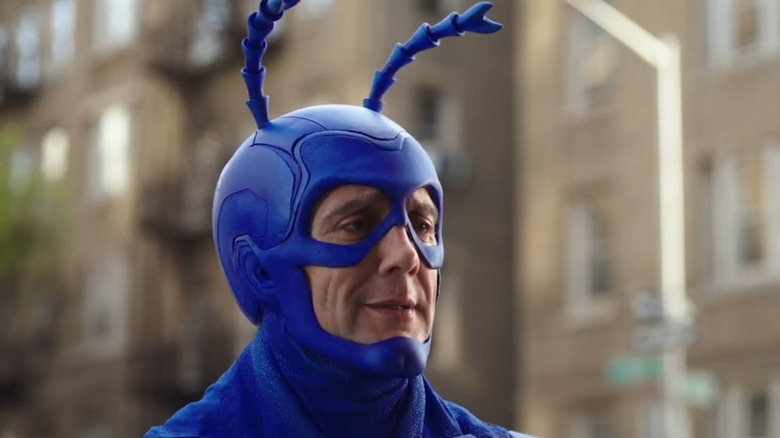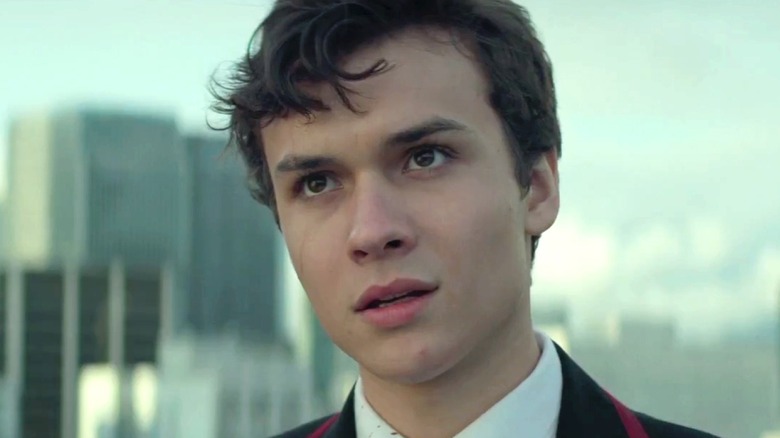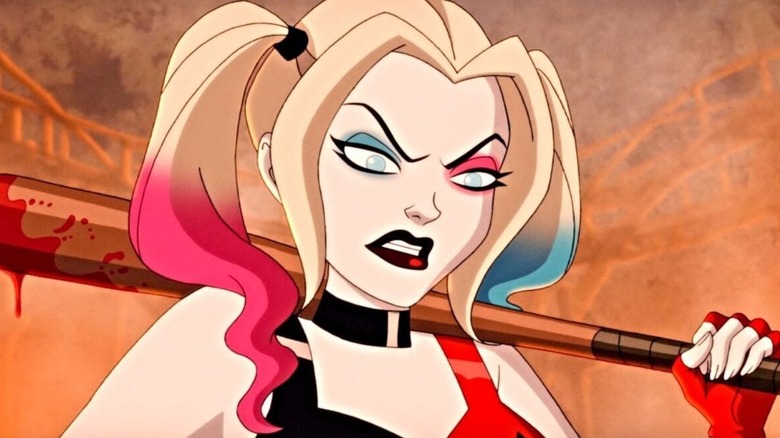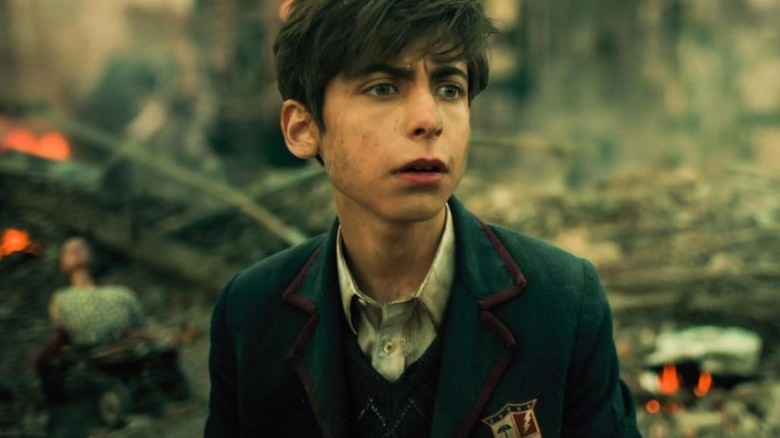Shows Like The Boys That Superhero Fans Need To Watch
"The Boys" is ultra-violent, rude, and boisterous. It's also bloody brilliant and laugh-out-loud hilarious as it parodies the superhero genre and all of its overused tropes. Rather than showcase these powerful individuals as the white knights of the series, it takes a page out of J. Jonah Jameson's Daily Bugle and positions these so-called heroes as the menaces they really are. Undoubtedly, this angle has worked as "The Boys" has become one of Amazon Prime Video's most-watched productions and even received a spin-off show.
While this highly stylized, satirical take on the genre is a breath of fresh air in the current climate, there are other shows that explore similar elements and try to put their own spin on this approach. They may never be exactly like "The Boys," but they're refreshing in their own way and might appeal to the same audience. Let's take a walk down the boulevard of broken superhero dreams and check out other series that fans of "The Boys" need to watch.
Invincible
On a surface level, "Invincible" looks like a typical superhero story that could have been born at Marvel or DC. A teenage Mark Grayson struggles between his regular life and proving he's worthy enough to be a hero to his father, Omni-Man, who happens to be the most powerful man on Earth. The twist to the tale, though, is something that would have superhero watchdog Billy Butcher from "The Boys" licking his lips in delight and loading up the arsenal. Especially since some of these heroes aren't who they pretend to be and need to be taken down.
"Invincible" is cleverly executed as it introduces the tried-and-tested tropes of the superhero genre and subverts them in every way imaginable. In addition, the adult animated series isn't afraid to get gory, as some of the blood-soaked, limb-tearing scenes look like they were pulled straight out of a horror movie. It's no surprise that "Invincible" found its home on Amazon Prime Video, as it appears the streaming service is adamant that it wants every available mature comic book property as part of its expanding roster.
Titans
If there was one term to describe "Titans," it would be: morally ambiguous. Dick Grayson and his pals might be presented as heroes, but they do more than a few things that would raise the Justice League's eyebrows. From their savage beatdowns of street thugs to occasionally crossing the line and burning people alive, these aren't the "New Teen Titans" introduced by Marv Wolfman and George Pérez. Instead, "Titans" is a darker, edgier reimagining of the DC team that broods more intensely than Jughead Jones in "Riverdale."
Yet here's the thing: While the Titans feature their own super-powered members, they also recognize that these powers can be curses or even weapons if placed in the wrong hands. In fact, it isn't hard to imagine this group begrudgingly teaming up with Butcher and The Boys to take down a bunch of rogue Supers — although it would be interesting to see if Butcher would take instructions from the usually bossy Grayson.
The Punisher
"The Punisher" was the last of Marvel's Netflix series to debut, in November 2017, though the vigilante had already appeared in Season 2 of "Daredevil." While the shows had already ventured into more mature territory than anything happening in the MCU, no one was prepared for the level of carnage that "The Punisher" was about to inflict on the crime world across two seasons. Every one of Frank Castle's kills was wild as the audience witnessed him using some inventive ways to torture his victims.
It also helped that Jon Bernthal's version of the character went down like a treat and became popular among fans. Perhaps he might even make a comeback in the MCU somewhere down the line, just like Charlie Cox's Daredevil and Vincent D'Onofrio's Kingpin; Bernthal told the Hollywood Reporter that he's keen as long as he can "do it right."
Comparing "The Punisher" to "The Boys," Butcher is basically a funnier version of Castle. Sure, he's a bit more talkative and might even possess a little more compassion (and charisma) than Franky Boy, but those guys are part of the same WhatsApp group of destruction. They love nothing more than to make their enemies look like a fatality out of "Mortal Kombat."
Preacher
"The Boys" comic book series was created by writer Garth Ennis and illustrator Darick Robertson. Ennis possesses a unique voice in comics, as he "[finds] most superhero stories completely meaningless" (as per SciFiNow). The reason for this, according to Ennis, is because "the stories can't end, so they'll never mean anything." As a result, his disdain for the Supers is loud and clear in "The Boys" comics and this comes across in the show as well.
Ennis co-created "Preacher" with artist Steve Dillon, which is another anti-superhero story that tackled touchy topics such as religion in a satirical and provocative manner. The TV adaptation of the series, starring Dominic Cooper as Jesse Custer — the preacher with the power to command others — maintained the same tone and feel as the comics. (Seriously, where else will we meet a character called A***face?) Due to its wicked sense of humor, buckets of bloodshed, and irreverent approach to anything "higher powered," "Preacher" solidifies itself as the perfect dance partner for "The Boys."
Todd McFarlane's Spawn
In 1997, there was still a belief that animated comic book shows or movies had to cater to kids. Considering the subject matter of the character Spawn and his relationship with Hell and all those impish creatures, it was always going to be a hard sell to get cartoon networks to faithfully adapt the source material. HBO took a gamble with "Todd McFarlane's Spawn" and it paid off in dividends, as the series filled with violence, profanity, and sexual innuendo ushered in a new era for comic book properties on television and even nabbed an Emmy.
In many ways, "Todd McFarlane's Spawn" crawled so that "The Boys" could walk. If it hadn't been for "Spawn" demonstrating that there is a market for adult-oriented superhero adaptations, "The Boys" would never have happened all these years later. It might not be as easily recognizable or critically heralded as "Batman: The Animated Series" or "Young Justice," but "Todd McFarlane's Spawn" played a crucial role in shaping modern-day comic book TV shows. All hail the Hellspawn!
Misfits
The one thing that's appealing about The Boys is how they're not your traditional archetypes of heroes. The team consists of a ragtag motley crew of misfits who seek their own form of redemption through questionable ways. And speaking of misfits, there's an excellent British sci-fi TV show by that very name. It also stars more than a few familiar faces, such as Robert Sheehan from "The Umbrella Academy" and Iwan Rheon from "Game of Thrones."
"Misfits" follows five juvenile offenders who get sentenced to do community service for their crimes. One fateful day, they get caught up in a storm that gives them special powers. Their abilities and how they decide to use them vary, but the show's focus always remains firmly on these quirky characters across its five-season run. Sharply written and dripping with dark British humor, "Misfits" has developed a strong cult following, with many fans hoping a revival is in the cards.
Watchmen
This entry is likely to upset a certain Alan Moore, but it needs to be said: The "Watchmen" series is easily one of the best comic book TV shows ever made. For all intents and purposes it shouldn't have worked, especially since it was treating itself as a sequel to the source material, but showrunner Damon Lindelof ensured that the core themes of the original were kept intact at all times. The show reignited and reinforced the cautionary messages of the comic book series for modern times.
Anyone who has ever read "Watchmen" by Moore and Dave Gibbons understands that it's a deconstruction of the entire superhero genre. It challenged the readers to see that these "heroes" were simply everyday people with flaws who shouldn't be worshipped. It's fundamentally what "The Boys" says too, as the show proves how power can corrupt the likes of Homelander and Stormfront into believing they're beyond reproach. "[Superheroes] seem to be the perfect fantasy of hope and empowerment for a world that increasingly lacks either," Garth Ennis told the Los Angeles Times. "Personally, not having grown up with superheroes, I find them completely moronic." Those sound like words that could have come straight out of Moore's mouth.
RoboCop
Let's face it: As much as everyone has tried, no one has matched the satirical genius of Paul Verhoeven's original 1987 film "RoboCop." Part of the reason for this is because the half-man, half-machine law officer became a global franchise, which meant the over-the-top violence and sociopolitical messages had to be toned down significantly. The "RoboCop" series, starring Richard Eden as the cyborg lawman, tried to balance the best of both worlds, as it strived to inject a bit of the gusto and flair lost in the critically slammed "RoboCop 3."
The 1994 show brought back "RoboCop" screenwriters Edward Neumeier and Michael Miner for the two-hour pilot (as per RoboCop Archive) and they decided to rework and revise their rejected "RoboCop 2" script, pretty much erasing the film sequels from existence. While the show didn't feature a smidgen of the violence splattered across the films (because of network television's strict rules), it still contained some of the stinging social commentary that we also find on "The Boys." Unfortunately, the "RoboCop" series didn't stick around for too long, as Alex Murphy's plug was pulled after a single season. Even so, that hasn't stopped the show from receiving the praise it deserved in the years since its cancellation.
The Tick
Cartoonist Ben Edlund created "The Tick" as a mascot for the New England Comics newsletter in 1986. Initially created as a parody of superheroes, the character became so popular that Edlund expanded the idea into a comic book series. The giant blue dude's rise to stardom didn't stop there, though, as the comics led to an animated series and two live-action shows. The second show, which featured Peter Serafinowicz as the titular hero, aired for two critically praised seasons on Amazon Prime Video.
Significantly, "The Tick" showcased how comedy and superhero shenanigans can work together in perfect harmony. The show wasn't afraid to get silly or tackle the most outrageous ideas as it understood the whole concept of superheroes shouldn't be overly serious in the first place. And that's something it shares in common with "The Boys," as there are certain WTF moments on the latter series that fans will laugh about for hours (or even days) after an episode ends. See: The Deep hallucinating that his gills were singing to him.
Deadly Class
Imagine this for a second: There's a private school where the biggest crime families from around the globe send their children to prepare for the future. Doesn't "Deadly Class" already sound like the pitch-perfect origin story for every comic book villain? Based on the comic book series created by Rick Remender and Wes Craig, the show only lasted for a single season, but it wasn't for the lack of quality. It embraced the rebellious attitude of the late '80s and whipped up a cast of intriguing and dynamic characters, whom we never knew if we could fully trust or not.
In much the same way that The Boys walk a fine line between doing right and wrong, the group of teens in "Deadly Class" follow a similar path. Marcus and his friends might never be considered heroes because of who they are, but they certainly behaved in heroic ways more than once. More importantly, where do we sign a petition to get this show back on the air?
Harley Quinn
When the "Harley Quinn" animated series was first announced, there was a mixed reception to the idea. Why would anyone want another adaptation of the Clown Princess of Crime when Margot Robbie's live-action version was right there and about as comic book accurate as they come? Turns out there's always room for more zany and violent interpretations, especially when it's so self-referential and isn't afraid to poke fun at the characters from the DC Universe. As Kaley Cuoco, the voice of the animated Harley, told Entertainment Weekly: "The show is unique, it's not 'Suicide Squad,' it's so different and obviously so insane, that we're able to make it exactly what we wanted."
Like "The Boys," "Harley Quinn" often positions the superheroes as the villains of the story — mostly since we're seeing everything through Harley's biased eyes. (Sometimes, though, Harley does have a valid point as we're shown how much of a hypocrite the likes of Batman and Jim Gordon can be.) Two seasons in, it's safe to say that the show hasn't lost its sense of humor or razor-sharp pointed commentary about the genre, much like its spirit animal on Amazon Prime Video. Plus, Doctor Psycho's colorful language might just rival Butcher's pottymouth.
The Umbrella Academy
What happens when the "X-Men" origin story about young gifted children being trained to be superheroes is given a twist where the Professor Xavier figure isn't really a good person or decent father? That's essentially the premise for "The Umbrella Academy." While it features its share of action and high stakes, it's mostly a tale about dysfunctional families and broken individuals dealing with their childhood trauma and an impending apocalypse.
Like "The Boys," no one in "The Umbrella Academy" is ever the walking embodiment of virtues. They all have their demons and they haven't always dealt with them in the right way. At the same time, they're trying to live their lives in the best way they can, which is something that's entirely relatable to the audience. These serious moments, though, are exquisitely balanced with a healthy injection of comedy and an outstanding score. Who wouldn't want to see an action scene set to the tune of the Kiss hit "I Was Made for Lovin' You"? It's a track that we could imagine forms a part of Hughie's rocking playlist as well.
